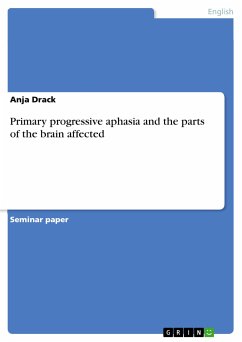Seminar paper from the year 2018 in the subject English Language and Literature Studies - Linguistics, grade: 2,3, University of Cologne, course: English Studies, language: English, abstract: Primary progressive aphasia is a relatively newly recognized subtype of dementia. Dementia is a clinical condition, in which a progressive decline of mental and emotional capacities occurs (Mesulam 2000:159). It affects fifty million people worldwide, with ten million new cases yearly (N.U. Dementia 2017). There is a wide variety of symptoms, including the loss or decline of memory, ability to focus, difficulties with reasoning, communication and language (Alzheimer's Society 2005:3), interfering with the independence of the daily living situation and activities (Mesulam 2000:159). To this day, Primary progressive aphasia is often misdiagnosed, because of its unpopularity and therefore lack of knowledge of many people. Those misdiagnoses steal valuable time to find effective treatments, which, at least, could slow down the progressive nature of the illness. Studying the relationship between language impairments and affected parts of the brain in Primary progressive aphasia, allows us to reach a better understanding of the language network in the brain and pushes forward the search for effective treatments or even a cure. This termpaper presents a review of literature, especially by Mesulam, on Primary progressive aphasia and the language impairments, declining progressively throughout the illness. The question this paper tries to answer is, what kinds of language impairments can be present in Primary progressive aphasia and which parts of the brain are responsible for certain deficits, when affected by different diseases. It will give information about the most common language impairments seen in patients, because no case is exactly the same and not everybody experiences the same difficulties. Furthermore, the paper will explore the language network of the brain, where it is located, which parts it includes and which parts play a role in Primary progressive aphasia, for short PPA. To look at the clinical picture from another perspective, a 14- years follow-up case study will give an example of speech impairments of a patient diagnosed with Primary progressive aphasia and show the neuropathological findings of the affected brain parts, which are responsible for the specific impairments.
Dieser Download kann aus rechtlichen Gründen nur mit Rechnungsadresse in A, B, BG, CY, CZ, D, DK, EW, E, FIN, F, GR, HR, H, IRL, I, LT, L, LR, M, NL, PL, P, R, S, SLO, SK ausgeliefert werden.









